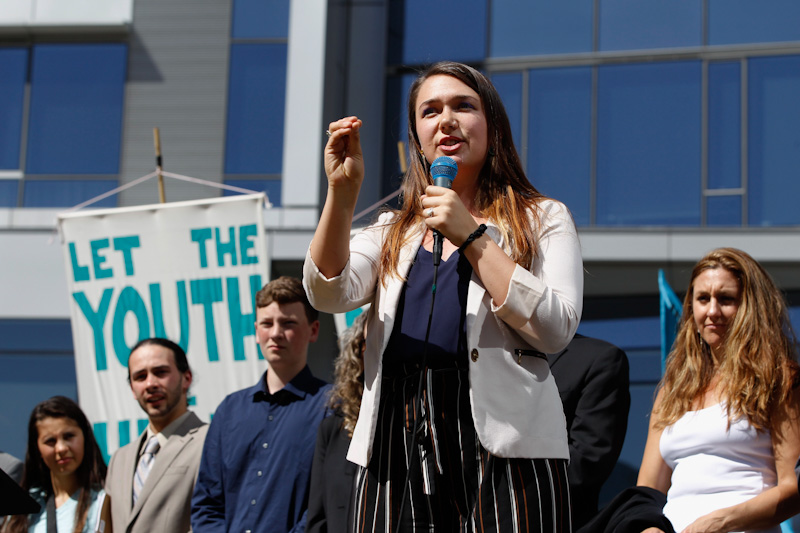U.S. Supreme Court
Climate change case that ‘ignited a movement’ ends with Supreme Court’s cert denial
Kelsey Cascadia Rose Juliana of Oregon, the lead plaintiff in Juliana v. United States, speaks at a rally in June 2019. (Photo by Steve Dipaola/The Associated Press)
The U.S. Supreme Court on Monday refused to revive a climate change lawsuit filed on behalf of 21 youths who contended that the government is a trustee of the environment and has a duty to preserve it.
The Supreme Court denied cert in Juliana v. United States, report Law360, Reuters, the New York Times, the Oregon Capital Chronicle and E&E News by Politico.
The 9th U.S. Circuit Court of Appeals at San Francisco had tossed the case in a 2020 opinion that said the issue should be taken to the political branches of government, rather than the courts. In May, the appeals court said a revised suit had not cured standing issues that prevented courts from deciding the case.
The name plaintiff in the suit, filed in 2015, is Kelsey Cascadia Rose Juliana, who is now 29 years old and a teacher in Oregon, according to the New York Times.
The U.S. Department of Justice said in a March 24 press release it has defended the case across three presidential administrations.
“The U.S. Supreme Court’s cert denial brings this long saga to a conclusion,” said Acting Assistant Attorney General Adam Gustafson of the DOJ’s Environment and Natural Resources Division, in the press release.
The case was filed on behalf of the children by the nonprofit group Our Children’s Trust. Julia Olson, the group’s chief legal counsel, said in a March 24 statement the suit’s impact “cannot be measured by the finality of this case alone.”
“Juliana has ignited a movement and created a powerful legal framework for future generations to assert their constitutional rights in the face of the climate crisis,” she said.
In one success for the group in late 2024, the Montana Supreme Court struck down a state law banning consideration of greenhouse gas emissions in fossil-fuel-permitting decisions. The state supreme court cited a state constitutional provision that guarantees a “clean and healthful environment.” The case was Held v. Montana.
In a second case in 2024, Hawaii agreed to cut emissions of carbon dioxide in its transportation system in a settlement with Our Children’s Trust.
Write a letter to the editor, share a story tip or update, or report an error.
